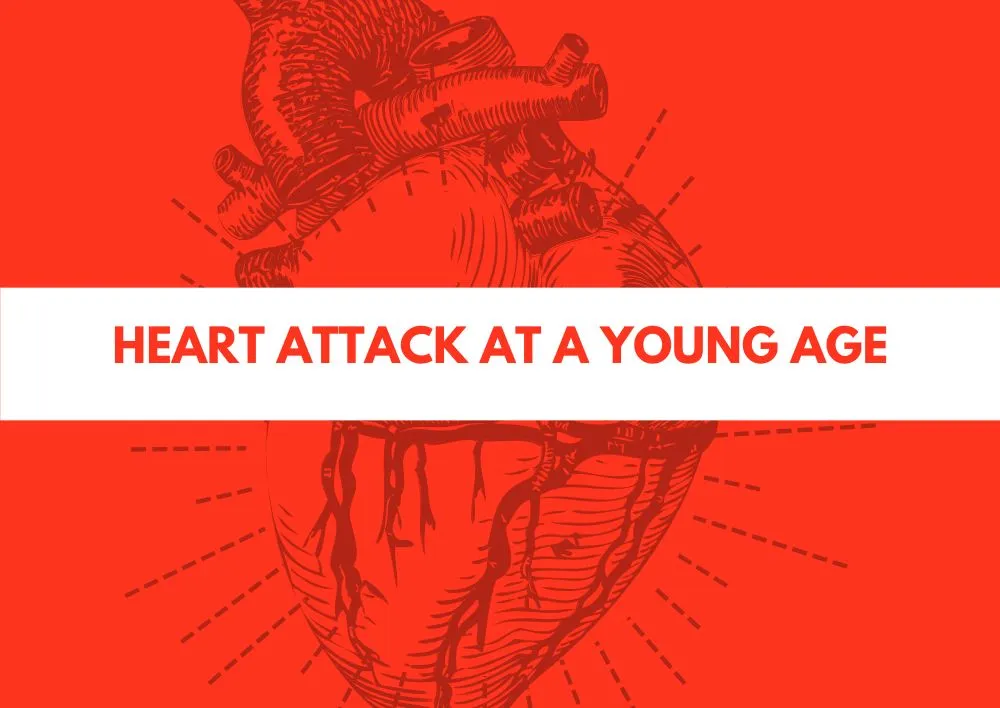Heart Attack at a Young Age
Heart attacks are traditionally associated with the elderly, but increasingly affect individuals at a younger age. Heart attacks among young individuals have become a growing global health concern. According to the World Health Organization (WHO), cardiovascular diseases, including heart attacks, are the leading cause of death worldwide, with an estimated 17.9 million deaths annually. While the average age of cardiac arrest is reported as 60 years, it's important to note that heart attacks can affect individuals at various ages.
Seeking consultation with heart specialists, including both cardiologists and cardiac surgeons, is crucial for the precise diagnosis and effective treatment of heart-related issues. At Miracles Apollo Cradle/Spectra, we take pride in our recognition as the best cardiology hospital in Gurgaon, where we prioritize complete cardiac care. Utilizing state-of-the-art technology and innovative treatments, our highly skilled and compassionate cardiologists provide personalized care tailored to each patient's unique needs.
In our commitment to comprehensive cardiac care, we offer a range of services, including thorough cardiac evaluations, advanced diagnostic procedures. Whether you seek preventive care, manage an existing heart condition, or explore treatment options, our dedicated team is here to guide you through every step of your healthcare journey.
If you experience symptoms such as chest pain, shortness of breath, or palpitations, or if you have risk factors for heart disease, don't hesitate to reach out to the best cardiologist near you at Miracles Apollo Cradle/Spectra. Early intervention can make a significant difference in managing and preventing heart-related complications.
For heart surgeon doctors appointment or more information, please visit at - https://www.miracleshealth.com/cardiology
Exploring Heart Attacks in Young Individuals: Causes, Symptoms, Treatments, and Prevention.
Global Scenario:
According to the World Health Organization (WHO), cardiovascular diseases account for approximately 31% of all global deaths. Studies indicate a 2% increase in young individuals under 40 over the past decade, highlighting the global impact of heart disease. Lifestyle choices, genetic factors, and environmental influences contribute significantly to the majority of heart attacks in this demographic.
Indian Scenario:
Turning our focus to India, the burden of cardiovascular diseases is substantial. Data from the National Health Profile (NHP) and the Indian Heart Association reveal that cardiovascular diseases are responsible for 63% of all deaths in the country. Research by the Indian Heart Association shows a 13% rise in heart attacks among Indians aged 30-40 in the last five years.
The prevalence of heart attacks in young Indians is alarming, with recent studies suggesting a genetic predisposition to cardiovascular diseases, making them more susceptible at a younger age. Additionally, lifestyle factors such as unhealthy diets, sedentary lifestyles, and increasing stress levels contribute significantly to the rising numbers of heart attacks in the younger demographic.
By understanding these statistics, we can better address the causes and risk factors, leading to more effective preventive measures against heart attacks in young individuals.
Understanding the Causes of Heart Attacks in Young Individuals
While heart attacks in young individuals are relatively less common compared to older adults, their occurrence remains an alarming concern. Several factors can contribute to this situation:
-
Genetic Conditions: Sometimes, there is a genetic factor involved, such as inherited heart conditions or familial hypercholesterolemia.
-
Poor Lifestyle Choices: Poor lifestyle choices, including smoking, excessive alcohol consumption, a sedentary lifestyle, or a diet rich in highly processed foods, can silently damage the heart over time.
-
Health Conditions: Underlying health issues such as diabetes, hypertension, or autoimmune disorders can increase the risk of cardiovascular problems, even in younger individuals.
-
Stress and Mental Health: Mental health issues such as chronic stress, anxiety, and depression can affect heart health and contribute to inflammation and other risk factors.
Understanding these contributing factors is important in promoting heart health among young individuals.
What is Heart Disease Types?
Heart diseases involves a range of conditions, each with distinct characteristics, causes, and risk factors. Here are some common types of heart diseases:
Coronary Artery Disease (CAD):
-
CAD is the most common type of heart disease, occurring when blood vessels supplying the heart muscle become narrowed or blocked by plaque.
-
Symptoms: Chest pain, discomfort, shortness of breath, and fatigue.
Heart Failure:
-
Heart failure occurs when the heart is unable to pump blood effectively, leading to reduced oxygen and nutrient supply to tissues and organs.
-
Symptoms: Shortness of breath, fatigue, swelling in the legs and abdomen.
Arrhythmias:
-
Abnormal heart rhythms, whether irregular, too fast, or too slow, can impact the heart's ability to pump blood effectively.
-
Symptoms: Palpitations, dizziness, and fainting.
Valvular Heart Diseases:
-
These involve problems with heart valves that regulate blood flow within the heart, including narrowing or leaking.
-
Symptoms: Chest pain, fatigue, and shortness of breath.
Congenital Heart Disease:
-
Present at birth, it involves structural problems with the heart affecting valves, walls, or blood vessels.
-
Symptoms: Bluish skin color, difficulty breathing, and poor feeding in infants.
Cardiomyopathy:
-
The heart muscle becomes weakened or enlarged, impacting its ability to pump blood effectively.
-
Symptoms: Fatigue, swelling, and shortness of breath.
Myocardial Infarction (Heart Attack):
-
A medical emergency occurs when blood flow to a part of the heart muscle is blocked, usually due to a blood clot.
-
Symptoms: Chest pain, discomfort, shortness of breath, and sweating.
Peripheral Artery Disease (PAD):
-
Plaque buildup in blood vessels supplying limbs, particularly the legs, can reduce blood flow.
-
Symptoms: Leg pain, numbness, and weakness
What are the Symptoms of Heart Disease?
Symptoms of heart problems can vary, and not everyone experiences the same set of symptoms. However, some common signs and symptoms related to heart problems include:
-
Chest Pain or Discomfort
-
Shortness of Breath
-
Rapid or Irregular Heartbeat
-
Unexplained Fatigue
-
Dizziness
-
Fainting
-
Swelling in the Legs, Ankles, or Feet
-
Nausea
-
Indigestion
-
Cold Sweats
It's important to note that every heart disease has its own set of symptoms. Additionally, women may experience heart disease symptoms differently than men. Early signs of heart disease in both males and females can be subtle, and some individuals with heart problems may not experience any symptoms at all, especially in the early stages.
If you suspect you or your loved ones are experiencing symptoms of a heart problem, seek medical attention immediately. Early detection and treatment are crucial for managing heart conditions and preventing complications. Individuals with risk factors for heart disease, such as high blood pressure, diabetes, smoking, or a family history of heart problems, should discuss their risk with a cardiologist and undergo regular check-ups for personalized care
What are Heart Disease Treatments?
The treatment for heart disease depends on the cause, severity, and specific type of heart problem. Treatment approaches may include lifestyle modification, medications, and medical or surgical procedures. Here is an overview of heart problem treatment:
-
Lifestyle Modification: Following healthy lifestyle habits, including adopting a low-fat diet, quitting smoking, limiting alcohol intake, maintaining a low-salt diet, engaging in regular exercise, and ensuring good sleep, is an integral part of treatment.
-
Medications: In some cases, lifestyle modification may suffice. However, if lifestyle changes alone are insufficient, cardiologists may recommend medications tailored to the specific type of heart problem. These medications aim to control symptoms and prevent complications associated with heart disease. Common categories include beta-blockers, ACE inhibitors, and anticoagulants.
-
Surgery or Medical Procedures: Individuals with severe heart damage may require a medical procedure or surgery. The type of procedure or surgery recommended by a cardiologist depends on the specific heart disease and the extent of damage. Common interventions may include angioplasty, stent placement, or bypass surgery.
Individuals with heart disease must work closely with their cardiologist to determine the most suitable treatment plan for their condition. Regular monitoring and adjustments to the treatment plan may be necessary to manage heart disease effectively.
Preventive Measures for Heart Attacks
Preventing heart attacks at a young age involves adopting a heart-healthy lifestyle and managing potential risk factors. Here are key preventive measures categorized for easy understanding:
Diet:
-
Add a variety of fruits, vegetables, whole grains, and lean proteins to your diet.
-
Limit trans fats, cholesterol, salt, and added sugars.
-
Use heart-healthy cooking oils.
Physical Activity:
-
Engage in at least 150 minutes of moderate-intensity exercises per week.
-
Include strength training exercises twice a week in your routine.
-
Stay physically active throughout the day, avoiding prolonged sitting or standing.
Weight Management:
-
If overweight, focus on gradual and sustainable weight loss.
Lifestyle Habits:
-
Quit Smoking: Smoking is a major risk factor for heart disease. Quitting it can reduce the risk of heart attacks.
-
Limit Alcohol Intake: Excessive intake of alcohol may increase blood pressure, leading to heart disease. Limit your alcohol intake to promote cardiac health.
-
Manage Stress: Practice stress-relieving techniques such as yoga, meditation, deep breathing exercises, or mindfulness.
Regular Health Check-ups:
-
Monitor blood pressure, cholesterol levels, and other relevant health markers.
Cardiologist Consultation:
-
Discuss your family history, especially heart issues, with a cardiologist and consider genetic screening if necessary.
Chronic Condition Management:
-
Manage conditions such as diabetes, hypertension, and high cholesterol through medication, lifestyle changes, and regular monitoring.
Education and Awareness:
-
Be aware of the signs and symptoms of heart attacks.
-
Actively participate in heart health education programs.
Preventive measures are highly effective when implemented properly. Consult with a cardiac surgeon specialist in Gurgaon for personalized advice based on your health condition. Making informed lifestyle choices about your heart health can significantly reduce the risk of heart disease at a young age.
Conclusion:
Heart attacks at a young age are a global concern. Understanding the risk factors and symptoms, and getting regular health check-ups can help individuals take proactive steps toward preventing premature heart attacks. Creating public awareness is essential for ensuring a healthier future for the younger generation.
Choosing Miracles Healthcare means entrusting your heart health to a facility that seamlessly combines medical excellence with a patient-centric approach. Our unwavering dedication to the highest standards of care has earned us a reputation as a trusted destination for individuals seeking the best cardiology treatment services in Gurgaon.
Miracles Healthcare offers comprehensive healthcare services through multiple facilities: Miracles Apollo Cradle, Miracles Apollo Cradle/Spectra, Miracles Fertility & IVF Clinic, and Miracles Mediclinic. Conveniently located in Sec 14, Sec 56, and Sec 82, our facilities make daily healthcare more accessible for the people of Gurgaon.
Take a proactive step towards a healthy heart by scheduling a consultation with our esteemed cardiologists specialist at Miracles Healthcare. Your heart deserves the best care, and we are here to provide it.














Was the information useful?
0 0